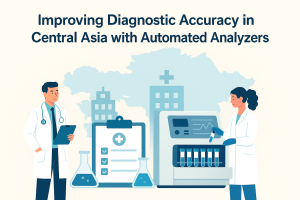Improving Diagnostic Accuracy in Central Asia
Central Asia’s healthcare systems are facing rising demand for faster, more accurate diagnostics. From tuberculosis outbreaks to a growing burden of chronic diseases, the need for reliable medical testing is greater than ever. Automated analyzers—ranging from biochemical analyzers to nucleic acid extractors—are playing a vital role in transforming diagnostics across the region.
 Healthcare Challenges in Central Asia
Healthcare Challenges in Central Asia
Limited Access to Advanced Medical Testing
Countries like Kazakhstan, Kyrgyzstan, Uzbekistan, and Tajikistan are experiencing increasing pressure on their healthcare infrastructures. In rural clinics and district hospitals, access to trained technicians and modern diagnostic devices is often limited. This leads to delays in diagnosis and treatment, particularly for infectious and chronic diseases.
Rising Burden of Infectious and Chronic Diseases
According to the WHO, tuberculosis, hepatitis, and measles remain persistent public health threats in Central Asia. Meanwhile, the incidence of hypertension, diabetes, and cardiovascular disease is rising due to lifestyle changes and urbanization.
To respond effectively, healthcare providers require lab diagnostics that are accurate, automated, and scalable.
The Role of Automated Analyzers in Clinical Diagnostics
What Are Automated Analyzers?
Automated analyzers are medical devices that conduct laboratory tests with minimal human intervention. Common types include:
-
Fully automatic biochemical analyzers: Used for liver function tests, blood glucose, lipids, and enzyme levels.
-
Hematology analyzers: Essential for complete blood counts (CBC) and identifying infection or anemia.
-
Nucleic acid extraction instruments: Critical for molecular diagnostics, especially in detecting viral infections like TB, COVID-19, and hepatitis.
Advantages for Central Asia’s Healthcare System
-
Improved Diagnostic Accuracy
Automation reduces human error, ensuring consistency in test results—vital in diagnosing diseases like diabetes and kidney disorders. -
Faster Turnaround Time
Quick testing supports timely clinical decisions, especially for emergency care or outbreak control in rural health centers. -
Cost-Effective for Resource-Limited Settings
While initial investment may be higher, the long-term savings from labor efficiency and improved patient outcomes are substantial. -
Scalable for Urban and Rural Deployment
Modern analyzers are compact, portable, and require minimal maintenance, making them suitable for both city hospitals and remote clinics.
Key Applications in Central Asia
Biochemical Testing for Chronic Disease Management
With a rise in non-communicable diseases, automated biochemical analyzers are used to monitor:
-
Blood glucose (for diabetes)
-
Cholesterol and triglycerides (for heart disease)
-
Creatinine and urea (for kidney function)
These tests help in early diagnosis and treatment adjustment.
Infectious Disease Detection with Nucleic Acid Extraction
Outbreaks of tuberculosis, hepatitis, and COVID-19 require fast, molecular-level diagnostics. Automated nucleic acid extraction systems enable hospitals to:
-
Isolate viral RNA/DNA quickly
-
Prepare samples for PCR or other molecular assays
-
Increase throughput during epidemic surges
XinRui Medical’s nucleic acid extractor is compact, CE-certified, and widely used across Southeast Asia and now expanding to Central Asia.
Hematology Analysis for Primary Screening
Complete blood counts are essential in diagnosing infections, anemia, and immune-related disorders. Portable hematology analyzers are crucial for clinics that lack full lab infrastructure.
Why Distributors in Central Asia Are Choosing XinRui Devices
Zhong Shan XinRui Medical Equipment Technology Co., Ltd offers a full range of diagnostic devices tailored for emerging markets:
-
Fully automatic biochemical analyzers: Compact, easy-to-use, compatible with a wide test menu.
-
Nucleic acid extraction machines: Efficient, high-precision, with minimal reagent consumption.
-
Rapid test kits: For respiratory, gastrointestinal, and infectious diseases.
-
CE-certified models available for select equipment; others meet ISO standards.
With established exports to Southeast Asia, XinRui is now actively seeking distributors and lab partners across Central Asia.
Building Better Diagnostics Infrastructure
Government and NGO Partnerships
Several Central Asian governments are investing in healthcare modernization. There are growing opportunities for public-private partnerships (PPPs) to equip national labs with automated analyzers and rapid testing capacity.
Development agencies and NGOs are also promoting access to decentralized diagnostics, especially in remote provinces.
Training and Support
Introducing automated equipment isn’t just about installation—it requires continuous support. XinRui offers:
-
Remote and on-site training in Russian and English
-
Maintenance support and reagent supply
-
Adaptable interfaces for local lab protocols
This ensures smooth integration into both urban hospitals and rural clinics.
Conclusion: A Smarter Future for Diagnostics in Central Asia
As Central Asia continues to confront both infectious and chronic disease challenges, the adoption of automated analyzers will be crucial to improving diagnostic accuracy, speed, and reach. Biochemical, hematology, and molecular testing platforms are no longer optional—they are essential tools in building resilient healthcare systems.
At XinRui Medical, we are committed to supporting diagnostic innovation across Central Asia. Whether you are a hospital, lab director, or distributor, our goal is to empower your success with smart, scalable, and reliable medical devices.
